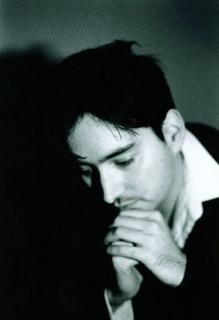 The artist (writer and photographer) Tony Kostadinov (as he was known to me then) took this photo of me presumably praying in Budapest sometime around the summer of 1999.
The artist (writer and photographer) Tony Kostadinov (as he was known to me then) took this photo of me presumably praying in Budapest sometime around the summer of 1999.One of his portraits (in a similar vein) of me was used in my first collection, Budavox: poems 1990-1999, and his cover image graced the, well, cover. Fans of the Budavox sign will be glad it was captured for such a publication.
Below, find a poem from that rather gloomy and lascivious book (and both things are possible at once, especially in Bp.).
My math is poor, but I suspect I was about 34 then, I should add. I am now still in my 30s, but you know how time is about such things.
You may wish to check out the artist's website at www.antonius.atw.hu and read his thoughts on the artist and creative health, as well as take a peek at his other portraits, some of very fascinating and beautiful people.
Endangered Species
Under inspection by a group
of anti-ghosts, they stopped me half-through
the fade routine, at infrared, with a spray
sent finely over the air to find my general form,
looped thin titanium from skull to heel, pleased
well with their delivery. The young, thin scientist,
eager to be cruel, caressed his find, asking
if I needed anything else. I tried bolting,
scrutiny held fast. I could feel my eyes drying
as if they were paints. The technician
in his green coat scratched my iris
for results. He predicted I was
the last of my kind. This meant release.
The electric band glisters at my throat.
poem by Todd Swift
Comments